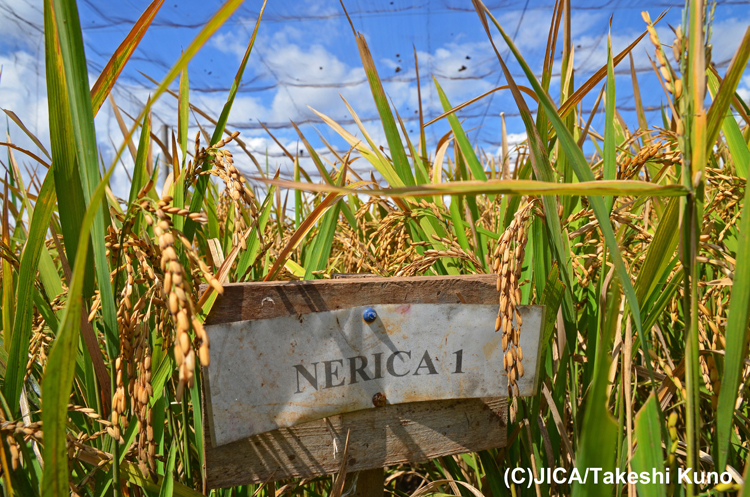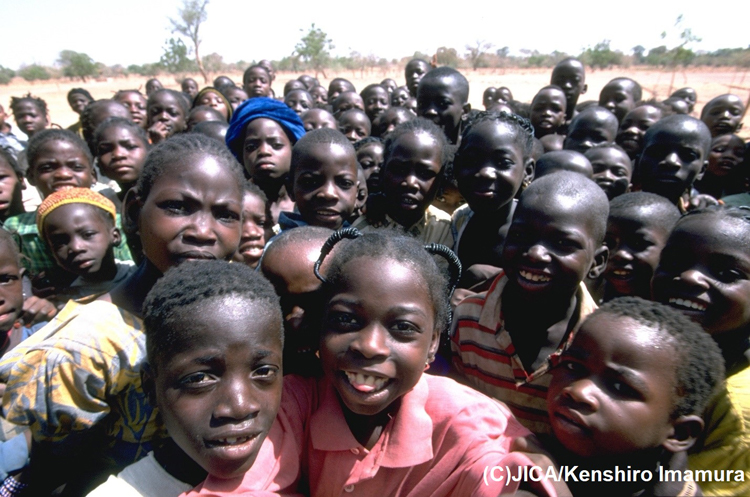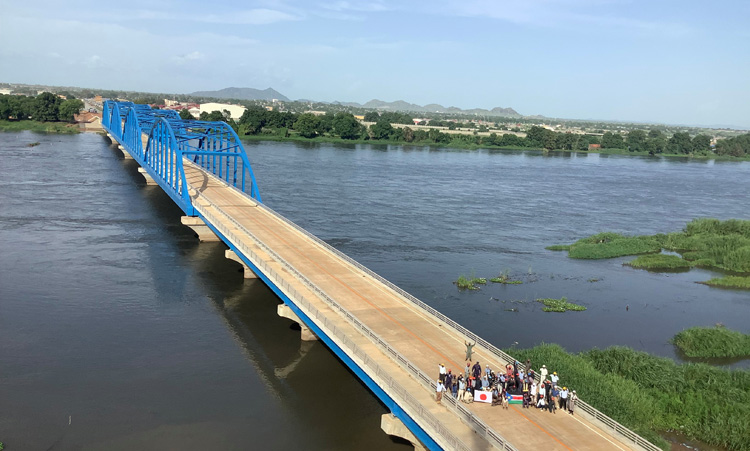Three Decades of Promoting Ownership and Partnership: A Look at the History of TICAD
July 14, 2022
This August, TICAD8 (the 8th Tokyo International Conference on African Development) will be hosted by Tunisia. This will be the eighth conference since the first one was held in Tokyo in 1993, marking its 29th year. In this article, we look back on the history of TICAD and highlight some of the important points from each conference in chronological order to clarify the TICAD philosophy that has evolved and been passed down through the years and to indicate directions for TICAD8.

In 2019, TICAD 7 welcomed over 10,000 participants, 42 African leaders from 53 African countries, 52 development partner countries, 108 heads of international and regional organizations, as well as civil society and private sector partners.
What is TICAD?
TICAD (the Tokyo International Conference on African Development) (external link) aims to (1) promote high-level policy dialogue among participating African leaders and development partners, and (2) mobilize support for African self-help development initiatives.
First held in 1993, TICAD is jointly organized by Japan, the African Union Commission (AUC), the United Nations, the United Nations Development Programme (UNDP), the World Bank.
History of TICAD:
(1) Before TICAD
Around 1993, when TICAD was first held, interest in Africa among developed Western countries was temporarily fading. Immediately following the end of the Cold War, building relations with Eastern European countries in the wake of the dissolution of the Soviet Union was of primary importance for the West. Therefore, the strategic importance of Africa, which had been at the forefront of the Cold War, had declined. In addition, the lack of visible effects from aid being provided by Western developed countries, combined with their own economic stagnation, led to "donor fatigue" and a reluctance on their part to support Africa.
At the time, the Japanese government was searching for new ways to contribute to the international community in the post-Cold War era. As Japan was at the height of its economic boom in the late 1980s, Japan became the world's largest contributor of ODA in 1989. Amid declining interest in Africa among Western industrialized countries, there was active discussion about what kind of international contributions Japan could make with facing the new Post Cold War era. It was against this backdrop that the first TICAD was held.
(2) TICAD I - TICAD II "Ownership" and "Partnership" put forth by Japan TICAD
I was held in Tokyo on October 5-6, 1993. Organized by the United Nations, the Global Coalition for Africa, and Japan. 48 African countries participated, with 5 African Heads of State and Government in attendance. It brought together 12 donor countries, the European Community, eight international organizations. The aim of the conference was "supporting the political and economic reform in Africa and evoking the attention of international society toward Africa". The Tokyo Declaration on African Development (external link), which was adopted as the outcome document, included the following items: self-reliance of African countries, economic development through activities of the private sector regional cooperation and integration, and future "South-South" cooperation between with East and South-East Asia with Africa. These items would be reiterated at later TICAD meetings.
The concepts of "ownership" and "partnership" indicated by then Prime Minister Morihiro Hosokawa in his keynote speech (external link) were pioneering concepts that have not only remained the core philosophy of TICAD to this day, but have also become the standard for African development conferences by various countries and organizations.
The ownership or "respecting ownership" is that of actively supporting the self-help efforts of developing countries. Japan has been a pioneer in advocating this concept earlier than the West. Based on its own history and experience in providing assistance to Southeast Asian countries, Japan believed that recipient countries should take the initiative in developing their own countries, which would lead to true economic independence. Respect for ownership is also recognized as important by various international organizations besides Japan.
Respect for partnerships is also the idea that, in order to support ownership by recipient countries, they should cooperate with diverse actors, including international organizations and non-governmental organizations.
TICAD I determined the framework of TICAD to be an open and multi-lateral platform where not only Africa and Japan but also international community discuss together on how to promote and support Africa's development. It contributed to raise awareness of the international community on the importance of African development, while there was concerns that the interest in Africa among developed Western countries was temporarily fading. This is the strong uniqueness of TICAD when compared with the other African development forums started by China, EU, etc. in 2000s following the success of TICAD I and II, which have been bilateral and closed to date.
TICAD II was held five years later, in October 1998, under the primary theme of "Poverty Reduction and Integration into the Global Economy". UNDP was added as co-organizers, and 80 countries, 40 international organizations, and 22 NGOs participated. The number of African Heads of State and Government jumped up to 15 from 5 in TICAD I. The Tokyo Agenda for Action (external link), adopted as the outcome document, reaffirmed the importance of ownership and global partnership, and reorganized the various issues raised at TICAD I into the three pillars of "Social Development and Poverty Reduction", "Economic Development" and "Basic Foundations for Development". Priority policies and actions, including specific numerical targets, were set, especially in the area of Social Development.

Various types of rice are grown at the Kilimanjaro Agricultural Training Centre (KATC) in Tanzania,
where Japanese cooperation has been continuing several decades.
(3) TICAD III - TICAD V Human Security and Growth of Emerging Economies
TICAD III welcomed 23 African Heads of State and Government, AUC Chairpersons, and the World Bank as a new co-organizer of TICAD. Ten years after the end of the Cold War, international conflicts had decreased, but domestic and regional conflicts caused by ethnic, religious, and cultural differences were still persistent. In addition, the negative aspects of globalization, such as international terrorism, crime, and infectious diseases, were expanding, and global-scale problems such as climate change and energy issues were becoming more serious. To address these issues, the concept of "human security," which is based on "protection" and "empowerment" of individual human beings against threats to their survival, livelihood, and dignity, has emerged in the international community. Japan has been leading the discussion on "human security," as evidenced by then Prime Minister Mori's call for a "Commission on Human Security" at the UN Millennium Summit.
The TICAD 10th Anniversary Declaration (external link), adopted at TICAD III in 2003, confirmed the achievements of "ownership" and "partnership," which had been advocated since the inception of TICAD, and also presented "leadership and public participation," "peace and good governance," "human security," and "respect for Africa's distinctiveness, diversity and identity" as a compass for the future. In addition, the Declaration expressed support for the efforts of the New Partnership for Africa's Development (NEPAD), a program of the African Union (AU) that evolved from the Organization of African Unity (OAU) in 2002. Then Prime Minister Koizumi presented three pillars as priority areas of support (external link): "human-centered development," "poverty reduction through economic growth," and "foundations for development (consolidation of peace and governance). While these pillars follow the framework that had been in place through TICAD II, "human-centered development" reflected the concept of MDGs and the concept of "human security" that had been put forth at the UN Millennium Summit in 2000.
The 2000s saw major changes in emerging economies. Emerging economies such as the BRICs (Brazil, Russia, India, and China) achieved remarkable economic development during this period and began to implement "South-South cooperation" as emerging donors to Africa, Various development cooperation forums, including the Forum on China-Africa Cooperation (FOCAC), which China has been implementing every three years since 2000, were also born. Africa itself entered a period of rapid growth against the backdrop of a resource boom and emerged from the "lost 20 years" that had continued since the 1980s. These circumstances fundamentally changed the donor-recipient relationship between developed and developing countries.
The theme of TICAD IV in 2008, which welcomed an unprecedented 41 African Heads of State and Government in Yokohama, was "Toward a Vibrant Africa - A Continent of Hope and Opportunity." The Yokohama Declaration (PDF), the outcome document, set "Boosting Economic Growth" as the first agenda item, followed by "Achieving the MDGs and ensuring human security, "the Consolidation of peace and good governance" and "Addressing environmental issues." The first agenda item, "Boosting Growth," while reflecting Africa's economic growth since early 2000s, states that the goal is to reform the economic structure that relies on primary commodities for sustainable growth in the future. Specifically, it was stated that the ways to achieve this goal include human resource development, accelerated industrial development, agricultural and rural development, trade and investment, promotion of tourism, etc., with emphasis on the cross-sectoral role of the private sector through strengthening of public-private partnerships. In response to the need for constant monitoring of the TICAD process pointed out by several African leaders at TICAD III, it was announced that a follow-up mechanism (PDF) consisting of a three-tier TICAD secretariat/joint monitoring committee/ministerial meeting structure would be launched at the time of TICAD IV implementation from 2009. Then Prime Minister Yasuo Fukuda expressed to double Japan's disbursement of ODA to Africa in five years to come.
The Yokohama Declaration 2013 (external link), which was adopted at TICAD V in 2013 welcoming African Union Commission as co-organizer, set forth the main issues of "Robust and Sustainable Economies", "Inclusive and Resilient Societies," and "Peace and Stability". Based on the basic principles of (1) respecting and supporting Africa's own initiatives, (2) establishing the rights of women and youth and expanding employment and educational opportunities, and (3) promoting human security, the Yokohama Declaration 2013 calls for (1) the promotion of private sector-led growth, (2) infrastructure development in the areas of hardware (utilization of private sector funds), human resources (industrial human resource development) and intellect (science and technology), (3) agricultural development, (4) ensuring resilience through disaster prevention, climate change response, and natural resource and biodiversity management, (5) providing primary education and health services for all, and (6) establishing peace, stability, and good governance. As can be seen from the order of these items, the emphasis continues from TICAD IV on sustainable economic growth in partnership with the private sector.
Beyond what was expressed in the outcome documents, private sector investment in Africa was the focus in TICAD V, as "From Aid to Investment" was selected as the slogan. Then Prime Minister Shinzo Abe pledged to invest 32 billion dollars from public and private sectors to Africa in five years to come.

Public Primary Schools Construction Project in Burkina Faso.
(4) TICAD VI - TICAD7 Towards Sustainable Development
Since TICAD V, TICAD has alternated between Africa and Japan every three years, with TICAD VI taking place in Kenya in 2016.
During the three years between TICAD V and TICAD VI, important changes occurred in Africa. One was stagnation of economic growth: real GDP growth in Africa, which had been high since 2002, slowed from around 2013. This is said to be caused directly by falling prices of primary commodities, and to be a consequence of Africa's dependence on primary commodities and their attending vulnerabilities.
The other was the exposure of political and social fragility: the attack on a Kenyan shopping mall in September 2013, the outbreak of civil war in South Sudan in December of the same year, the abduction of students by Boko Haram forces in Nigeria, and other conflicts and terrorist incidents by extremist groups. Meanwhile in West Africa there was an Ebola epidemic from late 2013 to early 2016.
In light of Africa's emerging vulnerabilities, the TICAD VI conference focused renewed attention on measures to ensure that Africa's economic growth is sustainable. The Nairobi Declaration (external link) agreed at TICAD VI was themed "TICAD Partnership for Prosperity: Advancing Africa's Sustainable Development Agenda" Three major emerging challenges were identified: "declining global commodity prices," "Ebola outbreak," and "radicalization, terrorism, armed conflict and climate change." As an approach to these issues, three new pillars were established as priority areas: "Promoting structural economic transformation through economic diversification and industrialization," "Promoting resilient health systems for quality of life," and "Promoting social stability for shared prosperity." In addition, the guiding principle was expressed to be in alignment with the "Agenda 2063" formulated by the AUC in 2015, and respect for voluntary African initiatives was emphasized in line with the principle of "ownership".
Needless to say, TICAD VI, with its emphasis on sustainability, was also in line with the SDGs resolved by the UN General Assembly in 2015. The Yokohama Declaration 2019 at the subsequent TICAD7 in 2019 clearly stated that TICAD should be in line with the international commitment to the SDGs. The Yokohama Declaration 2019 (PDF) identifies global challenges such as climate change, natural disasters, biodiversity loss, poverty and inequality, human migration, radicalization, and terrorism, and emphasizes the need to overcome these challenges while advancing and accelerating development and economic growth. The measures identified include "accelerating economic transformation and improving the business environment through innovation and private sector engagement," "deepening sustainable and resilient societies," and "strengthening peace and stability. In particular, with regard to cooperation with the private sector, TICAD7 goes further than in the past by including the private sector as a partner for the first time in history, which is in line with the SDGs' philosophy of encouraging proactive action by diverse actors. TICAD7 also focused the potential of digitalization and innovation by African young entrepreneurs, as its theme "Advancing Africa's Development through People, Technology and Innovation" endorsed.
Challenges of the New Era and TICAD8
As we have seen, TICAD has been centered on ownership and partnership since its first meeting but has updated its cooperation in response to the challenges of each era, such as "human security" and "sustainable development goals." To be held in the summer of 2022 TICAD will be asked how to achieve resilience, inclusiveness, and abundance in Africa in the face of external crises such as the global outbreak of the new coronavirus, climate change and the situation in Ukraine.

The completed Freedom Bridge in South Sudan. The bridge opening ceremony washeld on
May 19, 2022, with the flags of Japan and South Sudan being displayed.
Related Links
- International Crises Highlight the Importance of International Cooperation in Africa: Looking ahead to TICAD 8 (May 11, 2022)
- TICAD 8 Looks at Opportunities to Deliver Results on an Individual Level for Post-Corona Africa (May 18, 2022)
- The COVID Crisis has Highlighted the Importance of "Ownership" During Times of Instability (June 2, 2022)

